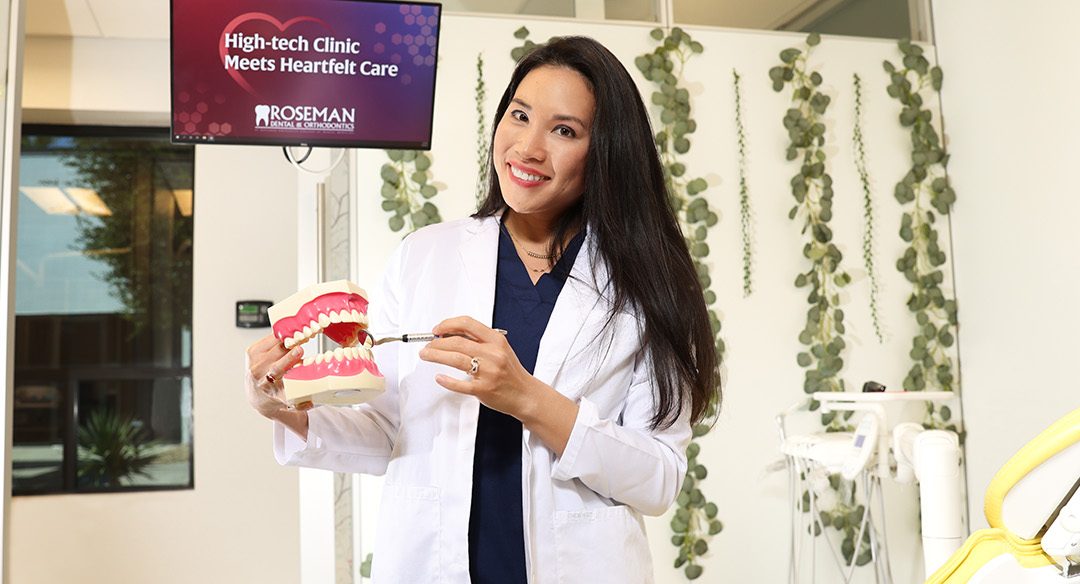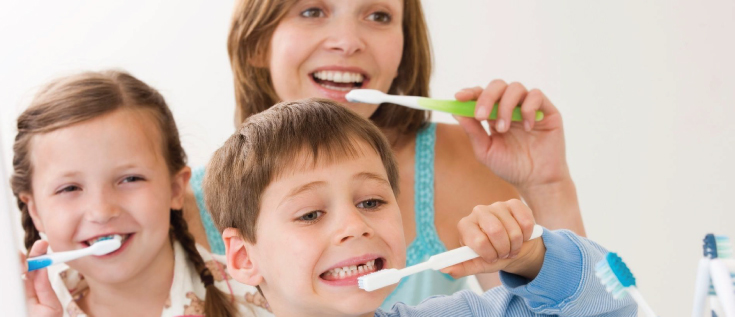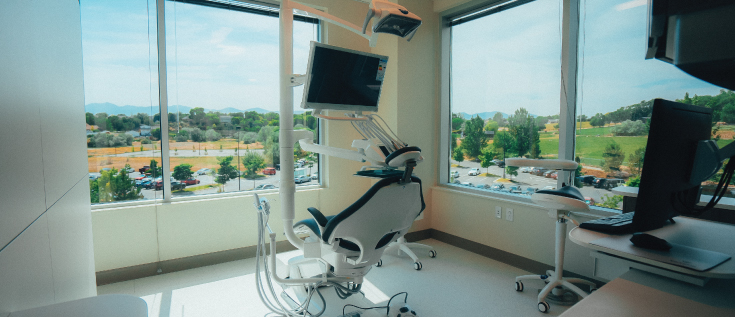
by Roseman Dental | Oct 1, 2022 | Dental Clinic Blog, Oral Health, Roseman Dental - UT
Brushing and flossing regularly are essential habits for healthy teeth, but did you know that nutrition is also important to the overall health of your mouth? It’s especially important to help kids start healthy eating habits while they’re young and their teeth are still developing. Here are the top nutrition tips to keep your family’s oral health strong.
1. Don’t Put the Baby to Bed with a Bottle
Many people like to put their baby to bed with a bottle of milk or other drink. However, this seemingly harmless practice actually allows bacteria to flourish and can lead to tooth decay. Giving your baby a bottle at night is okay, but make sure you follow it up with a gentle tooth-brushing session (or simply wiping their gums with a warm washcloth if they don’t have teeth yet) before putting your baby in bed.
2. Eat Plenty of Fresh Vegetables and Fruits
The standard American diet is extremely high in sugar. While avoiding sugar entirely may not be practical, it is best to limit consumption of sweets and sodas since they increase the risk of cavities. Even so-called “fruit” drinks contain highly concentrated amounts of sugar and should not be consumed in excess. Make sure to check the nutrition facts to get the real scoop on how much sugar is involved, even if a beverage claims to be fruit-based. If you or your children do have sweets, make sure to brush soon afterwards.
3. Avoid Sugary Foods
The standard American diet is extremely high in sugar, and while it may not be practical to avoid sugar altogether, it is best to limit consumption of sweets and sodas since they increase the risk of cavities. Even so-called “fruit” drinks contain highly concentrated amounts of sugar and should not be consumed in excess. If you or your children do have sweets, make sure to brush soon afterwards.
4. Drink Water with Food
Drinking water with each meal helps to wash away food particles and bacteria that might otherwise become stuck on or between the teeth and contribute to tooth decay. Taking a drink of water immediately after a meal serves the same purpose and can keep your mouth from becoming too dry.
A nutritious diet is just as important for oral health as brushing and flossing. Improving your current diet can be as easy as adding an extra portion of vegetables or fruit to a meal, eating fewer sweets, and increasing your water intake. Small changes can make a big difference.
Talk with your dentist about how your nutrition and oral health are connected. If you don’t have your next check-up on the calendar yet, make an appointment with Roseman Dental for affordable quality dental care.

by Roseman Dental | Sep 14, 2022 | Dental 360, Dental Clinic Blog, Providers - NV, Roseman Dental - NV
Dr. Chen recently joined Roseman’s College of Dental Medicine as a board-certified Pediatric Dentist at Roseman’s clinics in Henderson and Summerlin, NV. With a warm smile, kind face and gentle way about her, it is immediately obvious that she has a gift for connecting with children. Dr. Chen knew from a young age that she wanted to be a healthcare provider and that she wanted to use her hands in her profession. Shadowing an optometrist and dentist in high school, she connected quickly with the practice of dentistry but she had no particular plans or interest in treating children. Though Dr. Chen is the eldest of two girls in her family, she did not have a great deal of experience with or an affinity towards children, yet she found that her passion for pediatric dentistry grew while in her second year of dental school in Boston. She received her dental degree from Boston University and her specialty training in Pediatric Dentistry at Temple University. Originally from California, Dr. Chen received her bachelor’s degree in Psychology from UCLA with an emphasis in Developmental Psychology. In dental school, Dr. Chen worked alongside caring, compassionate faculty who took a great interest in mentoring her. Through this, she realized how important it was her to not only to provide preventative care, but to also ease pain and discomfort. Dr. Chen was born to parents who guided her not to a specific profession or interest, but toward an ethos, “be helpful and to take care of others.” She has most certainly followed this guidance in her professional life.
After a decade in private practice, in 2021, Dr. Chen made a personal decision to focus more time on the practice of pediatric dentistry and to let go of some of the administrative and business tasks associated with running a practice. When the opportunity arose at Roseman Dental & Orthodontics, it seemed like a perfect fit. “The opportunity at Roseman gave me the chance to place greater focus on doing what I love most—treating children. I couldn’t be happier about the opportunity to work in both of Roseman’s clinics. The entrée into academia also offered her the chance to return some of the goodwill and guidance offered to her by faculty when she was a student. In her new role, Dr. Chen has the chance to shape and inspire future providers.
Roseman Dental & Orthodontics, in addition to providing care to adults and children, is the home of the Advanced Education in General Dentistry (AEGD) residency, which hosts 2 residents per year through a partnership with NYU Lutheran Dental Medicine. These dentists receive advanced training through Roseman Dental & Orthodontics and are exposed to more complex cases. In her position, Dr. Chen is able to work alongside these residents, shaping their experiences and developing patient-centered practitioners while treating children. Roseman Dental & Orthodontics’ dental clinic also refers patients to Roseman Dental & Orthodontics’ ortho clinic, which is at the same address and next door.
Dr. Chen also practices at Roseman’s newest dental family member, Roseman Dental – Summerlin, Roseman’s pediatric dental clinic focused exclusively on treating medically compromised children in need of specialized dental care. Dr. Chen works alongside Dr. Michael Cottam, Clinic Director, to treat patients of Roseman’s partner organization, Cure 4 The Kids (C4K). C4K treats children with cancers, blood diseases and other life-threatening diseases. These children often put their dental needs aside, yet they need a dental home with dentists that work alongside their physicians to deliver what is often specialized care.
Dr. Chen is a beloved healthcare provider in the Nevada community. She brings to Roseman extensive experience, a deep commitment to improving the welfare and health of children, and a warm sense of optimism about her work. Dr. Chen and her husband Dr. Matthew Raddue, an anesthesiologist, enjoy being parents to their two children. Welcome Dr. Chen!

by Roseman Dental | Sep 7, 2022 | Dental 360, Dental Clinic Blog, Oral Health, Roseman Dental - NV, Roseman Dental - UT
Xerostomia is a big word with a simple definition: dry mouth. It’s the term for the absence of saliva in the mouth that can cause discomfort, often leading patients to seek medical treatment. The condition isn’t a disease in itself, but is actually caused by other factors.
While everyone experiences a dry mouth at one time or another, chronic dry mouth can not only be frustrating, but can also cause medical and dental issues. Treating xerostomia is important to improve overall quality of life as well as preventing any additional problems.
What Causes Xerostomia?
Many different issues can cause dry mouth. Some of the causes for this common condition include:
- Medications. Many over-the-counter and prescription drugs list dry mouth as a side effect.
- Nerve damage. Damage to the nerves that control saliva production can result in xerostomia.
- Cancer treatments. Chemotherapy drugs or radiation can halt the production of saliva.
- Other diseases. Parkinson’s or Sjogren’s syndrome can affect the salivary gland.
Other conditions, including stress and depression, can lead to a lower production of saliva as well.
What Problems does Xerostomia Cause?
Leaving xerostomia untreated can lead to further issues. The condition can cause difficulties with speech and eating, as well as an increase in cavities or infections in the mouth, since salvia helps wash away bacteria from the surface of the teeth.
What is the Treatment for Xerostomia?
To begin treatment for xerostomia, its root cause must be discovered. Eliminating the cause isn’t always possible, so dental professionals will find a treatment option that addresses the issue while not detracting from other medical care.
Some remedies can treat dry mouth, but they won’t cure it. These options include avoiding alcohol-based mouthwashes, using artificial saliva, sipping plain water, or using over-the-counter dry mouth products. Prescription medications can be used to stimulate saliva production in order to replace the saliva and prevent other medical and dental issues.
Dry mouth should be treated not only because of the discomfort it causes, but also because of the serious issues it can cause. Prioritize good oral care and regular dental treatments to prevent further problems. If you’re in need of dental care, make an appointment with Roseman Dental to get help from one of our empathic, patient-focused providers.

by Roseman Dental | May 11, 2022 | Dental 360, Dental Clinic Blog, Oral Health, Roseman Dental - NV, Roseman Dental - UT
One of the biggest advantages to living in the digital age is the overwhelming amount of information that is just a click away. However, with so much discussion regarding almost every topic imaginable, it is easy to understand why so many rumors and myths get passed around. Since the dental arena is not immune to perpetual misinformation, here are three common myths debunked:
Dental Myth #1
A fancier or more expensive toothbrush results in cleaner, healthier teeth.
The Truth
It is not the type of toothbrush you use, but the manner in which you use it that makes all the difference. Brushing twice a day for two minutes at a time is the key to healthier teeth and gums. This can be easily accomplished whether you opt to use a simple, soft bristle manual toothbrush, or a higher-end electric one. The most important factor is to be comfortable with your selection and use it on a consistent basis.
Dental Myth #2
The harder you brush, the better your results.
The Truth
Brushing your teeth harder does not improve your oral health. In fact, it can have potentially damaging effects! Excessive brushing with aggressive force can lead to enamel loss and gum recession, which can ultimately expose roots and cause sensitivity and tooth decay. If you are unsure if you are a harsh brusher, talk with your dentist so they can assess your routine and provide helpful suggestions. Part of an assessment by a dentist involves measurement and scoring of any potential gum recession. These measurements are taken at each visit and compared against each other to identify long-term recession.
Dental Myth #3
Regular brushing eliminates the need for regular dental cleanings.
The Truth
Plaque, a biofilm with a soft mashed potato-like consistency, begins to form on your teeth within 20 minutes after eating. If it isn’t brushed away within eight hours, it hardens into tarter that brushing cannot remove. Tarter build-up leads to gum disease and tooth decay. Only a dentist or dental hygienist will have the tools necessary to properly and effectively remove tarter from the teeth.
When it comes to oral health, false information can be damaging. The most important way to make your dental health a priority is by seeking out a reputable dentist who can dispel myths and provide you with the facts. Your mouth will thank you for it.

by Roseman Dental | May 10, 2022 | Dental 360, Dental Clinic Blog, Dental School, Oral Health, Roseman Dental - UT
The College of Dental Medicine at Roseman University of Health Sciences has opened a new state-of-the-art clinical floor of Roseman Dental, the clinical practice of Roseman University College of Dental Medicine, South Jordan, Utah location.
This clinical floor is dedicated to Team-Based Education, which is a new education model that focuses on team practice rather than the traditional single-practice model widely used throughout the United States.
As an expansion to the existing Roseman Dental clinical space, the Team-Based Education clinical floor shares the same high-quality patient-centered operating procedures, general and specialty dentistry services, and affordable pricing.
However, there are very distinct differences between the two clinical spaces. In the existing clinic space, the faculty dentist, dental hygienist, and dental assistants oversee the students in providing direct patient care and treatment while students fill the support positions.
The Team-Based Education clinical floor puts a fresh perspective on this traditional teaching model. The new model allows the faculty dentist and dental hygienist to directly provide team-based general dentistry care to patients and teach students their initial procedures in the clinic.
“Since the pandemic began, we have seen a higher demand for flexible healthcare service,” said Dr. Frank Licari, Dean of the Roseman University College of Dental Medicine. “There has been an expansion of urgent care clinics, telemedicine and drive-thru testing and vaccination facilities. Dental practices will also have to evolve to meet patient demands that want more convenient hours and services. We are dedicated at Roseman to prepare our graduates to be successful in that new dental practice environment.”
Dental assistants are more actively engaged in providing direct chairside assistance to the providers. Students continue to rotate and train through all support positions, including dental assistant and hygienist, emphasizing learning how to treat a volume of patients as a dentist, thus creating a student “Team-Based” educational model and service delivery in a clinical setting.
This updated perspective is the vision of an educational model that prepares graduates for a future-ready group practice environment. As such, Roseman is developing a futuristic faculty educator and a highly efficient person-centered care delivery system in which student learning and assessment occur without compromising overall patient care outcomes.
Each team has eight students and one faculty dentist (Team-Based Educator) to treat assigned patients. The faculty dentist is accountable for the patients progressing through treatment and actively interacting with students by demonstrating and providing probing questions to assess student knowledge and progress through competence.
“This team-based education model will lead dental practices to serve a higher volume of patients per day,” Dr. Licari said. “Our students now see six to eight patients a day, compared to the traditional teaching model which students could only see two patients a week.”
Students are paired in teams based on the provider’s patient needs and skill level, and all procedures have a recommended time interval for completion. The vision and significant focus of the clinic are to provide person-centered care at maximum efficiency. Efficiency is collected via integrated technology throughout the clinic and assessed under specific quality control measures.
As part of Roseman’s commitment to graduate future-ready practitioners, the Team-Based Education clinical floor is significantly focusing on technology integration through all aspects of the clinic. The clinic is equipped with collaborative student workspaces with large interactive digital screens, digital signage, scheduling displays, etc. It has built-in innovative Bluetooth technology with data-collecting sensors to optimize operational efficiency, student education, and patient care. Patient appointments are monitored for efficiency, timeliness, and overall patient satisfaction.
Roseman believes the Team-Based Education clinical floor’s educational model is the future of dental education and will serve as a model moving forward.







